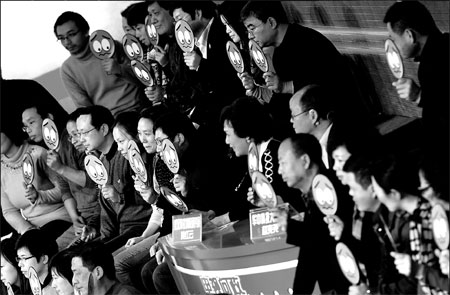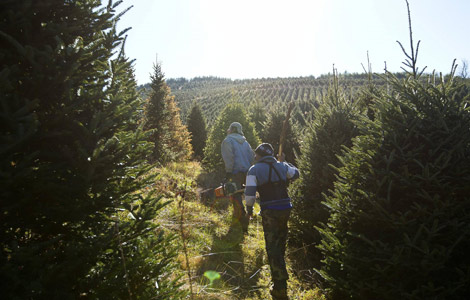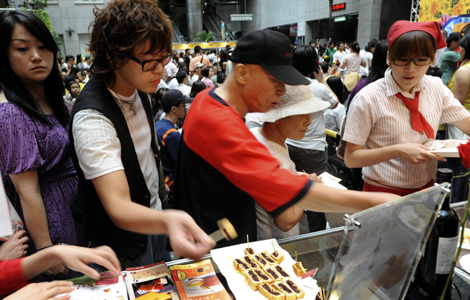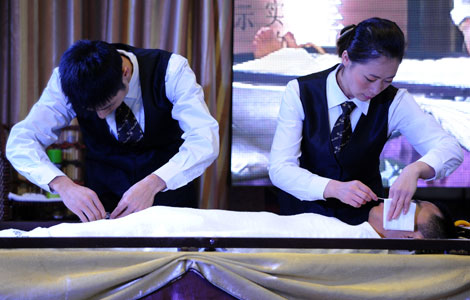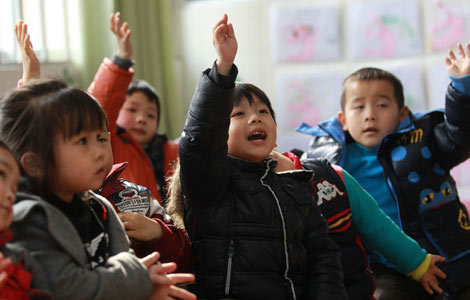Officials defend work on TV
Updated: 2012-12-31 07:42
By Shi Yingying in Shanghai and Zhou Lihua in Wuhan (China Daily)
|
||||||||
|
Members of the audience raise "sad-face" cards to show their dissatisfaction with the local government's performance at this year's third TV broadcast of Wuhan officials' annual briefing on their work on Dec 19. People sigh when scenes of traffic accidents are shown on the screen and the director of Wuhan Traffic Management Bureau sweats on stage. Jin Siliu / for China Daily |
Studio appearances taken into account for yearly job performance evaluations
Government officials in two cities have taken to standing in front of TV cameras and talking about their work in live broadcasts, a step experts said will help bring the government closer to the people.
Some, though, are wondering if it is all just a meaningless show.
Officials from Wuhan, capital of Central China's Hubei province, were brought under scrutiny recently when questions about food safety and illegal construction were raised on a local TV program.
On Dec 17, the TV program showed a plate of meat covered in sauce being offered to a group of guests who included Qin Jun, deputy mayor of Wuhan, and Yang Zefa, head of the city's food and drug administration. It then broadcast video revealing that the dish had been prepared in unhygienic conditions and stored in the toilet of a cooked-food workshop.
"I felt angry and sorry after I watched this," Yang said . "How could food like that be offered on our tables?"
He made a public bow in apology.
Immediately after the show had aired, Qin Jun went in the company of law enforcement officials to investigate the store's conditions.
He Zhiqiang, a planner at the TV program, said the show attracted higher audience ratings than other programs broadcast at the same time. Even so, he said the show places a greater "value on social influence (than ratings)".
"The aim of the show isn't to solve individual problems," he said. "We're calling on the government to work out a long-term mechanism (that will prevent such problems from happening)."
Wu Zhongxin, spokesman for Wuhan's discipline inspection commission, said ordinary people should have an opportunity to evaluate the work of government officials at the end of every year. That was why, he said, they were invited to participate in the TV program.
"Some critics may say this kind of man-of-the-people style is an act, but it's the 'act' that solves grassroots problems and we should do more," he said.
In the meantime, 27 government department heads from Zhejiang province's Wenzhou talked about their work on Dec 20, both on Wenzhou Television and the Wenzhou News Network.
Among the speakers were directors of the local land and resources bureau, the development and reform commission and the environmental protection administration.
Their TV performances will be directly linked to their positions next year, according to Lin Shengbao, director of the city's performance appraisal office and the official in charge of assessing government officials.
"The live broadcast is an important part of their annual evaluations," Lin said. "Representatives of the masses, media and Wenzhou People's Congress are invited to perform the evaluations."
Those who ranked toward the bottom in the evaluations will see their annual bonuses reduced and face demotion, Lin said.
Wenzhou, a wealthy coastal city known for private entrepreneurs, was caught in an informal loan market debacle following a string of bankruptcies last year.
When giving his speech on camera, Zhang Zhenyu, director of the city's financial office and the official in charge of the financial reform, sweated profusely.
"The fact that some of our officials embarrassed themselves by sweating in front of the camera revealed there may be flaws in their work," said a professor from the school of journalism and communication at a university in Wuhan, who only gave his surname, Wang.
"The format for the show is a new type of media supervision that we've never tried before," the professor said.
Shen Yi, at Fudan University's department of international politics, said Wuhan's and Wenzhou's live TV broadcasts mark an improvement, as they both prove that "what was hidden before is visible to the public nowadays".
"But that will also encourage officials who can came off sounding good on the show," Shen said. "People need their government to perform real deeds rather than just talk."
Ma Songliang, a shoe factory director in Wenzhou, said: "At least we know what's going on over there. We now know what our government did in the past year and their working progress."
Ma said he is worried about "whether they actually tell the truth".
"I think it's more important to do something concrete."
Contact writers at shiyingying@chinadaily.com.cn and zhoulihua@chinadaily.com.cn
Yu Ran contributed to this story.
(China Daily 12/31/2012 page5)
